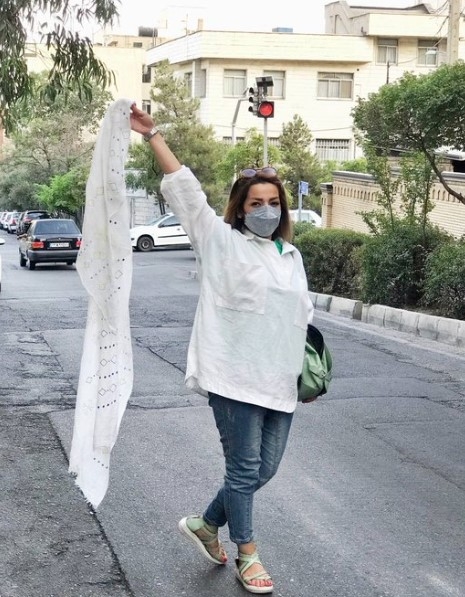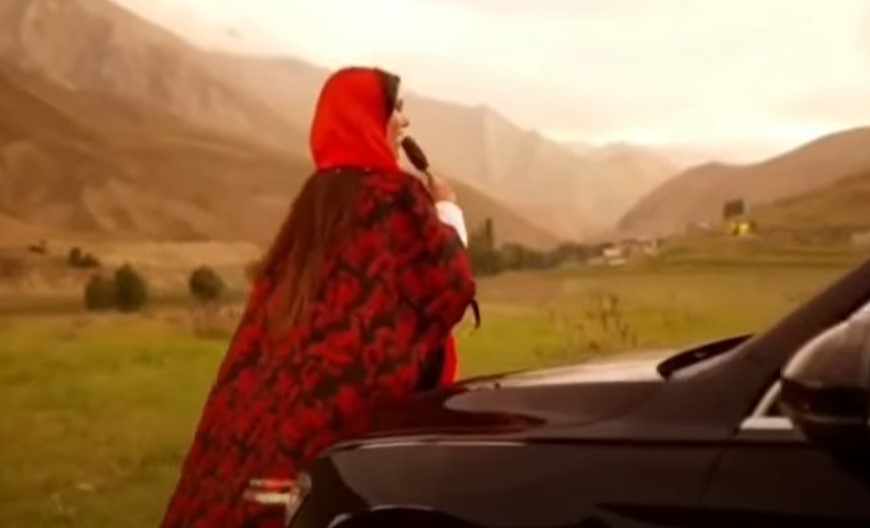 Many women used Iran's National Day of Hijab and Chastity to protest the country's mandate on covering their heads. |
Despite the theocratic regime's firm grip over Iranian society, there are indications of growing disillusionment. Iran's dire economic condition, dominant state corruption, nepotism, problematic rule of law and the Islamic Revolutionary Guard Corps' state-privileged financial activities, have increased feelings of unrest and disappointment.
On Sept. 6, Amnesty International condemned Iran for sentencing of two LGBT activists, Zahra Sedighi Hamedani and Elham Chubdar, to death with trumped-up charges of "corruption on earth." This intentionally vague term is used by the Islamist regime for those who violate strict Islamic laws, in this case for allegedly promoting homosexuality and supposed trafficking. The two women were also found guilty of "promoting Christianity" and "communicating with media opposed to the Islamic republic." The death sentences are a clear message to the Iranian society to conform to the official ideology and morality.
Social control in the public sphere is mounting in Iran, in an attempt to preserve the state-imposed Islamist set of values. In late August, authorities announced their intention to start using camera surveillance in the subway to identify women who do not wear the compulsory headdress, the hijab. The hijab has been mandatory since the Islamic Revolution of 1979.
But now, women caught unveiled can face fines. Iranian subways will be equipped with CCTV cameras and facial recognition technology to identify the women, Mohammad Saleh Hashemi Golpayegani, the secretary of Iran's Headquarters for Enjoining Right and Forbidding Evil – in essence, Iran's morality police, said in an Aug. 30 interview.
The announcement followed a new executive order issued by hardline Iranian President Ebrahim Raisi to ensure enforcement of the national hijab and chastity law.
 YouTube image |
Women, who face increased discrimination by the Islamist regime, are leading some of this resistance through original forms of protest.
Many Iranian women chose to leave their homes without the obligatory hijab on July 12, which is the country's National Day of Hijab and Chastity. They posted videos of themselves publicly removing their veils, while activists posted stickers and leaflets with the message "No2Hijab." At the streets of Iran's cities, there are also clashes between citizens and officials during violent arrests of women and girls by the morality police. Resistance to forced hijab continues.
In late August, women were allowed to attend a national soccer match for the first time in decades. They used the occasion to pay tribute to a fan who had set herself on fire in 2019 to protest the authorities' ban on female spectators. Chanting "Blue girl, blue girl" – a reference to the colors of her favorite soccer team – dozens of women at Tehran's Azadi Stadium honored the memory of 29-year-old Sahar Khodayari. She set herself on fire in front of the courthouse where her case was to be heard after she was arrested for trying to enter Azadi Stadium dressed as a man. As a result, there are increased calls by both international organizations, such as the international soccer organization FIFA, and Iranian politicians to officially end the ban on women spectators in stadiums.
"I wish you had voluntarily opened stadium gates to Iranian women and FIFA's pressure wasn't behind the realization of [female fans'] right [to watch games in stadiums]," Azar Mansouri, the first female party leader in Iran, wrote in an op-ed in a reformist newspaper. Women reportedly can attend a World Cup qualifying match next month, a decision which followed pressure from FIFA, international soccer's governing body.
Some protests have turned violent, and include physical assaults. There are multiple reports of attacks on clerics in various parts of Iran, coming as public discontent increases over worsening living conditions and the state-imposed social restrictions.
In June, a young man was arrested after assaulting a top provincial cleric in the central city of Isfahan. In late August, two clerics were beaten up by two unknown assailants in Qom, a city serving as a religious center. It seems that the attacks are a reaction to the regime's attempt to enforce the strict religious codes in public such as the hijab rule. In general, Iran under the Islamist regime remains one of the most oppressive societies worldwide according to a Human Rights Watch report.
It is true that the wave of protests and disarray with the Islamist regime's strict social and moral policies has not yet translated into mass protests on the streets. Still, large segments of Iranian society yearn for change and the right to decide their future without the oppressive policies of the hardline Islamists who have isolated Iran from the world community for decades.
 Ioannis E. Kotoulas (Ph.D. in History, Ph.D. in Geopolitics) is Adjunct Lecturer in Geopolitics at the University of Athens, Greece.
Ioannis E. Kotoulas (Ph.D. in History, Ph.D. in Geopolitics) is Adjunct Lecturer in Geopolitics at the University of Athens, Greece.
Copyright © 2022. Investigative Project on Terrorism. All rights reserved.
